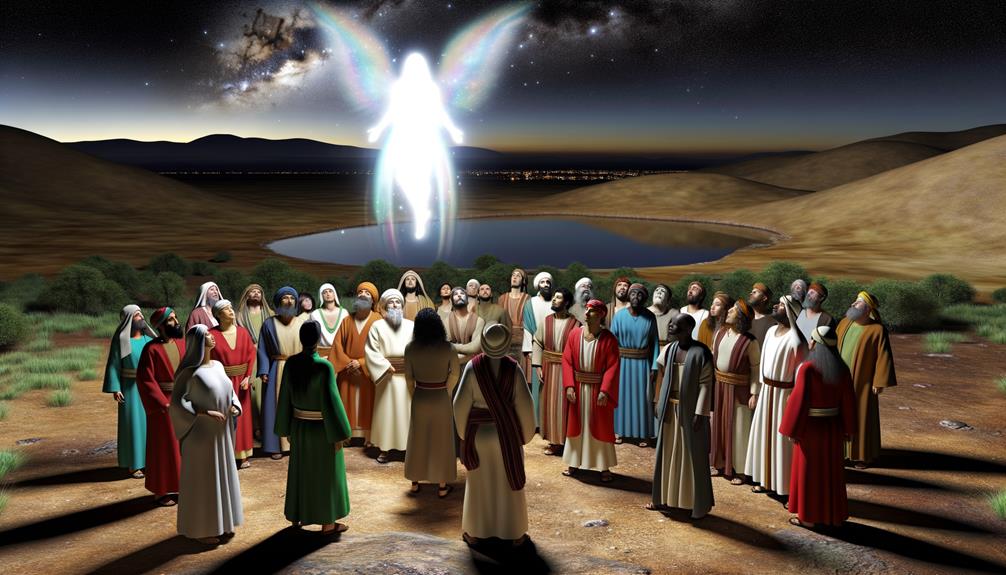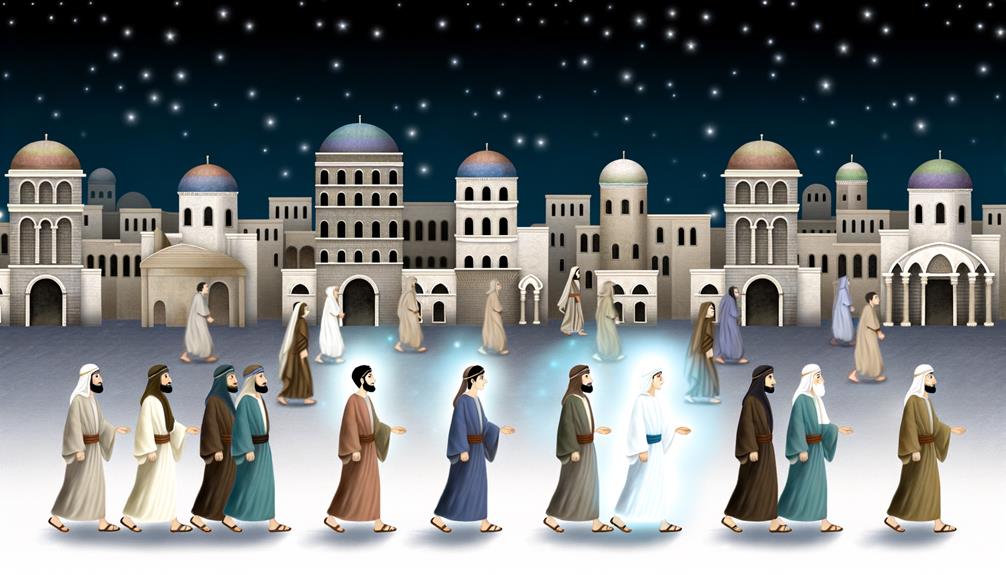Alien In The Bible Meaning: Strangers and Sojourners
In biblical context, the term ‘alien‘ refers to foreigners or sojourners residing within Israelite communities. Derived from Hebrew words ‘ger’ and ‘nokri,’ it signifies non-Israelites living under distinct yet equitable laws.
The Old Scripture underscores compassionate treatment of these aliens, paralleling Israel’s own historical experiences as foreigners in Egypt (Leviticus 19:34). In the New Scripture, the Greek term ‘xenos’ expands on this inclusion, emphasizing hospitality and the Christian ethos of universal brotherhood (Ephesians 2:19, Hebrews 13:2).
Discover more about the deeper moral and spiritual implications rooted in these ancient texts.

Alien in the Bible Meaning: Spiritual and Scriptural Interpretation
| Aspect | Explanation |
|---|---|
| Biblical Usage | Refers to foreigners or sojourners (Exodus 22:21, Leviticus 19:34) |
| Symbolism | Outsiders, spiritual seekers, or those without covenant |
| Moral Teaching | Commands to treat aliens with kindness and justice |
| Spiritual Perspective | Reflection of God’s inclusive nature and call to love the stranger |
| Faith Message | Emphasizes hospitality, empathy, and unity within God’s people |
Definition of ‘Alien’ in the Bible

In biblical terminology, the term ‘alien‘ frequently refers to a foreigner or stranger residing temporarily within the community of Israel.
Theologically, the ‘alien’ is often depicted as a non-Israelite who lives among the Israelites, sharing in some communal aspects but remaining distinct in cultural and religious identity.
Historical context indicates that aliens were subject to specific laws and protections, reflecting ancient Near Eastern customs of hospitality and justice.
Scriptural analysis reveals that the Hebrew words ‘ger’ and ‘nokri’ are typically translated as ‘alien’ or ‘foreigner,’ highlighting the nuanced relationships between Israelites and non-Israelites.
The Bible addresses the treatment of aliens with a focus on ethical obligations, emphasizing compassion and equity in social and legal frameworks.
Old Testament References

The Old Scripture contains several intriguing references that scholars often examine for their potential implications regarding extraterrestrial beings.
The enigmatic identity of Abraham’s visitors in Genesis 18, the detailed and otherworldly vision experienced by Ezekiel in Ezekiel 1, and Jacob’s visionary encounter with a ladder reaching to heaven in Genesis 28 each provide fertile ground for such theological and historical scrutiny.
These passages invite a nuanced analysis to explore whether they signify divine encounters or hint at the presence of otherworldly entities.
Abraham’s Visitors’ Identity
Abraham’s visitors, as described in Genesis 18, are traditionally interpreted by scholars to be a theophany, representing divine messengers or the Lord Himself.
The narrative recounts three men appearing to Abraham by the oaks of Mamre, with one often identified as Yahweh and the other two as angels. This interpretation is supported by the visitors’ prophetic announcement of Sarah’s impending pregnancy and their subsequent mission to assess the sinfulness of Sodom and Gomorrah.
The historical context and scriptural analysis highlight that these visitors are not extraterrestrial beings but manifestations of God’s presence. The account emphasizes hospitality, divine judgment, and covenantal promises, integral themes within the broader theological framework of the Old Scripture.
Ezekiel’s Vision Explained
Ezekiel’s vision, described in the opening chapter of the Book of Ezekiel, presents a complex and vivid imagery that has been the subject of extensive theological and scholarly analysis.
The vision includes a majestic chariot, four living creatures, and wheels within wheels, suggesting a divine encounter. Scholars propose various interpretations, ranging from symbolic representations of divine attributes to actual celestial phenomena.
| Aspect | Description | Theological Interpretation |
|---|---|---|
| Four Living Creatures | Representations of God’s omnipresence | Cherubim, symbols of divine power |
| Wheels within Wheels | Complex movement and omniscience | God’s all-seeing nature |
| Firmament | Crystal-like expanse above the creatures | Divine separation and holiness |
| Throne | Sapphire throne with a radiant figure | Manifestation of God’s glory |
This visionary experience is pivotal in understanding prophetic revelations and divine interaction.
Jacob’s Ladder Encounter
Frequently highlighted in theological discussions, Jacob’s ladder encounter in Genesis 28:10-22 presents a profound moment of divine revelation and covenantal promise.
In this passage, Jacob dreams of a ladder reaching from earth to heaven, with angels ascending and descending. This vision symbolizes the connection between the divine and the earthly domains, emphasizing God’s active involvement in human affairs.
The LORD’s promise to Jacob, reiterating the Abrahamic covenant, underscores themes of land, progeny, and divine blessing.
Historically, scholars interpret the ladder as a ziggurat-like structure, reflecting ancient Near Eastern motifs.
Scripturally, it serves as a precursor to the New Covenant’s depiction of Christ as the ultimate mediator between heaven and earth, enriching its theological significance.
New Testament Usage

In the New Covenant, the Greek term ‘xenos‘ frequently appears, encompassing notions of both literal and metaphorical ‘foreignness.’
This term especially surfaces in contexts emphasizing hospitality, as seen in Hebrews 13:2, where believers are encouraged to welcome strangers.
Additionally, ‘xenos’ serves as a spiritual metaphor, illustrating the believer’s transient state in the world, as depicted in 1 Peter 2:11.
Greek Term “Xenos”
The Greek term ‘xenos,’ often translated as ‘stranger’ or ‘foreigner,’ appears multiple times in the New Scriptures, carrying significant theological implications for the early Christian understanding of hospitality and community.
Within the New canon, ‘xenos’ underscores the inclusive ethos that Christ and the apostles advocated.
Notable uses of ‘xenos’ include:
- Matthew 25:35: Jesus speaks of welcoming the ‘xenos’ as an act of righteousness.
- Ephesians 2:19: Paul emphasizes that believers are no longer ‘xenoi’ but fellow citizens with the saints.
- Hebrews 13:2: The author exhorts believers not to forget to show hospitality to ‘xenoi’.
- 1 Peter 4:9: Peter encourages offering hospitality without grumbling, implicitly including ‘xenoi’.
These references reveal the scriptural mandate to embrace the ‘xenos’ as an integral aspect of Christian duty.
Contexts of Hospitality
New Covenant teachings on hospitality elucidate the early Christian community’s ethos, emphasizing the importance of welcoming strangers as a reflection of divine love and grace.
The New Scriptures, particularly in Hebrews 13:2 and Matthew 25:35, underscore the spiritual imperative to extend hospitality. Hebrews 13:2 admonishes believers to entertain strangers, for by doing so, some have entertained angels without knowing it, highlighting a mystical dimension. Matthew 25:35 further establishes a direct correlation between welcoming strangers and serving Christ Himself.
Historical context reveals a nascent church often marginalized, finding strength and identity in communal bonds. Such scriptural mandates not only fostered unity but also modeled Christ’s inclusive love, reinforcing hospitality as a core Christian virtue.
Spiritual Metaphor Usage
Numerous New Covenant passages employ spiritual metaphors to convey profound theological truths, using familiar imagery to elucidate the transformative power of divine grace. The New Scripture often uses the concept of ‘alien’ to signify spiritual separation and subsequent inclusion through Christ.
- Ephesians 2:19: Paul states, ‘So then you are no longer strangers and aliens, but you are fellow citizens with the saints.’
- 1 Peter 2:11: Believers are addressed as ‘sojourners and exiles,’ emphasizing their temporary earthly residence and heavenly citizenship.
- Hebrews 11:13: The faithful are described as ‘strangers and exiles on the earth,’ highlighting their forward-looking faith.
- Philippians 3:20: Paul reminds the church, ‘Our citizenship is in heaven,’ underscoring spiritual allegiance.
These passages illustrate the fundamental Christian journey from alienation to divine acceptance.
Cultural Contexts

How does understanding the historical and cultural contexts of ancient Near Eastern societies illuminate the meaning of ‘alien’ in biblical texts?
The term ‘alien’ often translates to ‘ger’ in Hebrew, referring to a foreigner or sojourner. In the ancient Near East, societies were tribal and often hostile to outsiders.
The concept of an ‘alien’ in biblical texts reflects the precarious status of non-natives who resided among the Israelites. Scriptural analysis reveals that these individuals were afforded certain protections and responsibilities under Mosaic Law, distinguishing Israelite society from its contemporaries.
Recognizing this cultural backdrop provides deeper insight into biblical imperatives for justice and hospitality, highlighting the unique ethical framework that governed the treatment of aliens within Israelite communities.
Treatment of Aliens

The treatment of aliens in biblical texts, particularly under Mosaic Law, reveals a profound commitment to justice and hospitality that set Israelite society apart from its ancient Near Eastern counterparts.
The Israelites were instructed to extend their ethical and moral obligations to non-Israelites residing among them. This inclusivity can be seen in several key aspects:
- Equality Before the Law: Aliens were to be treated with the same legal rights as native-born Israelites (Leviticus 24:22).
- Provision and Protection: Aliens were to be provided for, including access to gleanings during harvests (Leviticus 19:9-10).
- Love and Compassion: Israelites were commanded to love the alien as themselves (Leviticus 19:34).
- Remembrance of Egypt: The treatment of aliens was often linked to Israel’s own experience as foreigners in Egypt (Exodus 22:21).
Biblical Laws on Aliens

The Old Covenant provides numerous guidelines on the treatment of aliens, emphasizing hospitality and inclusion.
Laws such as those found in Leviticus 19:33-34 and Deuteronomy 10:18-19 mandate that the Israelites treat strangers with the same respect and care as native-born citizens, reflecting a divine imperative for justice and compassion.
These scriptural mandates reveal a theological and historical framework that underscores the importance of equitable treatment for all individuals, regardless of their origin.
Old Testament Guidelines
In the Old Scripture, the treatment of aliens and sojourners is governed by a series of explicit laws and guidelines, reflecting the broader ethical and theological ethos of ancient Israelite society.
These laws underscore a commitment to justice, compassion, and communal integrity, extending protections and responsibilities to non-Israelites.
- Exodus 22:21: Prohibits the oppression of aliens, reminding Israel of their own experience as strangers in Egypt.
- Leviticus 19:34: Commands love for the alien as oneself, equating their rights with those of the native-born.
- Deuteronomy 10:19: Calls for the love of aliens, rooted in divine love and Israel’s history.
- Numbers 15:15-16: Establishes uniformity in laws for both aliens and Israelites, ensuring equal treatment in religious observances.
Treatment of Strangers
Building upon the foundational guidelines established in the Old Scriptures, the treatment of strangers, or aliens, within Israelite society is further elucidated through specific biblical laws that emphasize equitable and humane treatment. The scripture mandates the fair treatment of foreigners, reflecting a divine expectation for justice and compassion. Key laws from the Torah include:
| Scripture Reference | Directive |
|---|---|
| Leviticus 19:34 | Love the stranger as oneself |
| Exodus 22:21 | Do not mistreat or oppress strangers |
| Deuteronomy 10:19 | Show love to aliens |
| Leviticus 24:22 | Same law for native-born and alien |
These directives highlight the theological principle that all humans, irrespective of origin, are entitled to dignity and respect.
Hospitality and Inclusion
Frequently emphasized in biblical texts, hospitality and inclusion towards aliens are cornerstones of Israelite ethics, reflecting a broader divine mandate for community and solidarity.
Biblical laws concerning aliens are rooted in the Israelites’ own experience as strangers in Egypt, fostering an empathetic approach toward outsiders.
- Leviticus 19:34 – ‘The alien who resides with you shall be to you as the citizen among you; you shall love the alien as yourself, for you were aliens in the land of Egypt.’
- Deuteronomy 10:19 – ‘You shall also love the stranger, for you were strangers in the land of Egypt.’
- Exodus 22:21 – ‘You shall not wrong or oppress a resident alien, for you were aliens in the land of Egypt.’
- Hebrews 13:2 – ‘Do not neglect to show hospitality to strangers, for by doing that some have entertained angels without knowing it.’
Alien Vs. Stranger

Understanding the distinction between ‘alien’ and ‘stranger’ in biblical texts requires a nuanced examination of linguistic translation, historical context, and theological implications.
In Hebrew, terms like ‘ger’ (stranger) and ‘nokri’ (alien) appear frequently, often denoting someone from outside the community of Israel.
Historically, ‘alien’ suggests a more permanent outsider status, while ‘stranger’ can imply a temporary sojourner.
Theologically, these terms underscore the inclusive ethos commanded by God, urging Israelites to love and treat them justly (Leviticus 19:34).
This distinction is critical for comprehending the broader scriptural narrative and the evolving identity of the community of faith, reflecting God’s concern for all humanity, regardless of origin or status.
Hospitality Toward Aliens

The biblical mandate to extend hospitality towards aliens is deeply rooted in the same ethical framework that commands just treatment of strangers, reflecting the divine imperative for compassion and equity. This is illustrated in various scriptural passages that emphasize the importance of welcoming and caring for the foreigner.
- Leviticus 19:34 – ‘The alien who resides with you shall be to you as the citizen among you; you shall love the alien as yourself, for you were aliens in the land of Egypt.’
- Deuteronomy 10:19 – ‘You shall also love the stranger, for you were strangers in the land of Egypt.’
- Hebrews 13:2 – ‘Do not neglect to show hospitality to strangers, for by doing that some have entertained angels without knowing it.’
- Matthew 25:35 – ‘For I was hungry and you gave me food, I was thirsty and you gave me something to drink, I was a stranger and you welcomed me.’
Symbolism and Metaphors

In biblical literature, the term ‘alien‘ often serves as a rich metaphor for the people of God in exile, reflecting their spiritual and social dislocation. This metaphorical usage underscores the transient nature of human life and the journey towards a divine homeland.
Scriptural passages, such as Psalm 39:12 and Hebrews 11:13, depict believers as ‘strangers and pilgrims,’ emphasizing their temporary status on earth. Historically, the motif of exile resonates deeply with Israel’s Babylonian captivity, offering a theological framework for understanding alienation and belonging.
This symbolism extends to the New Covenant, where Christians are encouraged to see themselves as sojourners in a world not their own, thereby fostering a sense of spiritual pilgrimage and ultimate redemption.
Relevance for Modern Readers

Exploring the relevance of the term ‘alien’ in the Bible for modern readers invites a profound reflection on themes of spiritual exile, identity, and divine belonging that continue to resonate in contemporary faith journeys. This scriptural concept can provide invaluable insights through:
- Spiritual Exile: Reflecting on the human condition of feeling estranged in a world that is often at odds with divine values.
- Identity: Understanding oneself as a ‘sojourner’ or ‘pilgrim,’ fostering a sense of transient existence and eternal purpose.
- Divine Belonging: Emphasizing the importance of heavenly citizenship over earthly affiliations, fostering a community bound by faith.
- Hospitality: Encouraging modern believers to show kindness and acceptance to strangers, mirroring divine grace.
These themes underscore the timeless relevance of Biblical teachings on ‘alien’ for today’s spiritual seekers.
Conclusion
The concept of ‘alien’ in the Bible, through its various Old and New scriptures references, encompasses both literal and metaphorical dimensions.
These passages reflect historical contexts, cultural norms, and theological imperatives. The treatment of aliens underscores the ethical mandates of hospitality and justice. Parallels between aliens and strangers illuminate broader moral teachings.
Like a tapestry woven with threads of compassion and divine law, these scriptural insights offer enduring relevance for contemporary readers.






